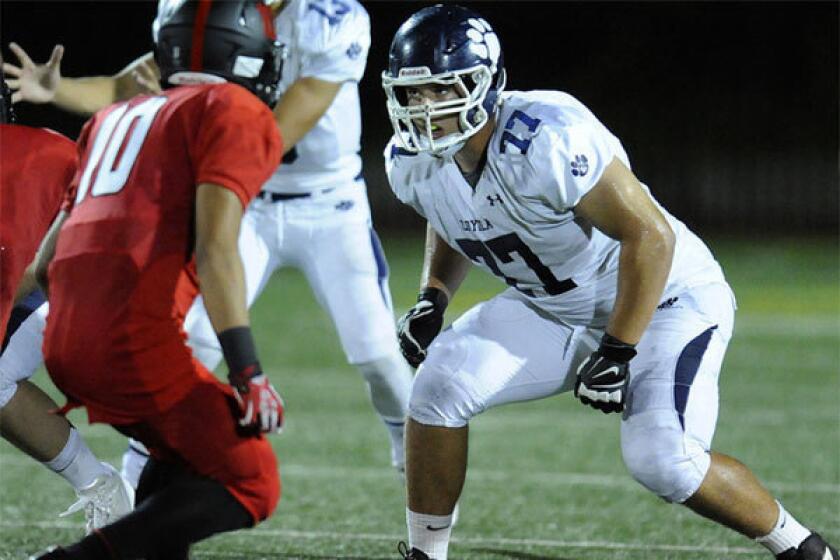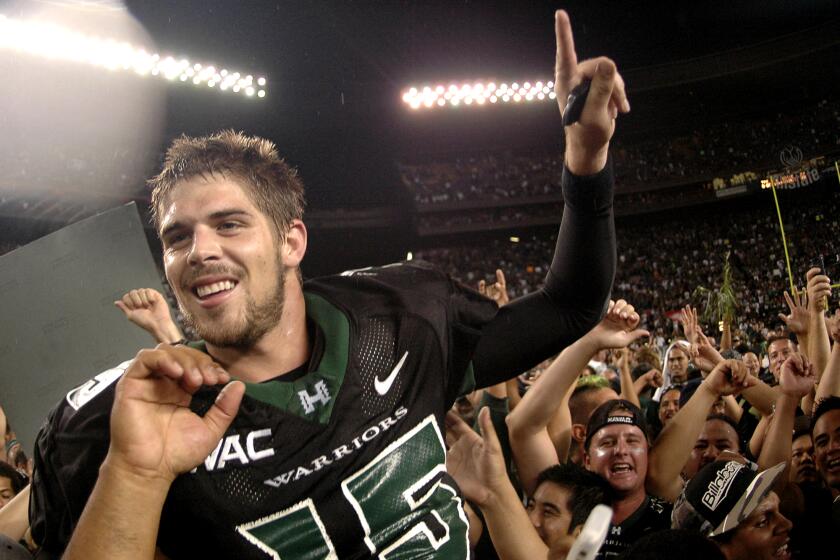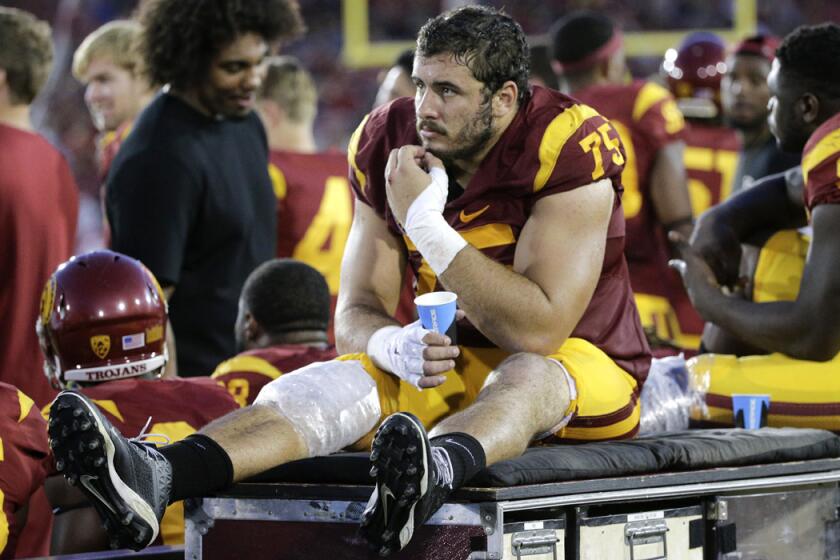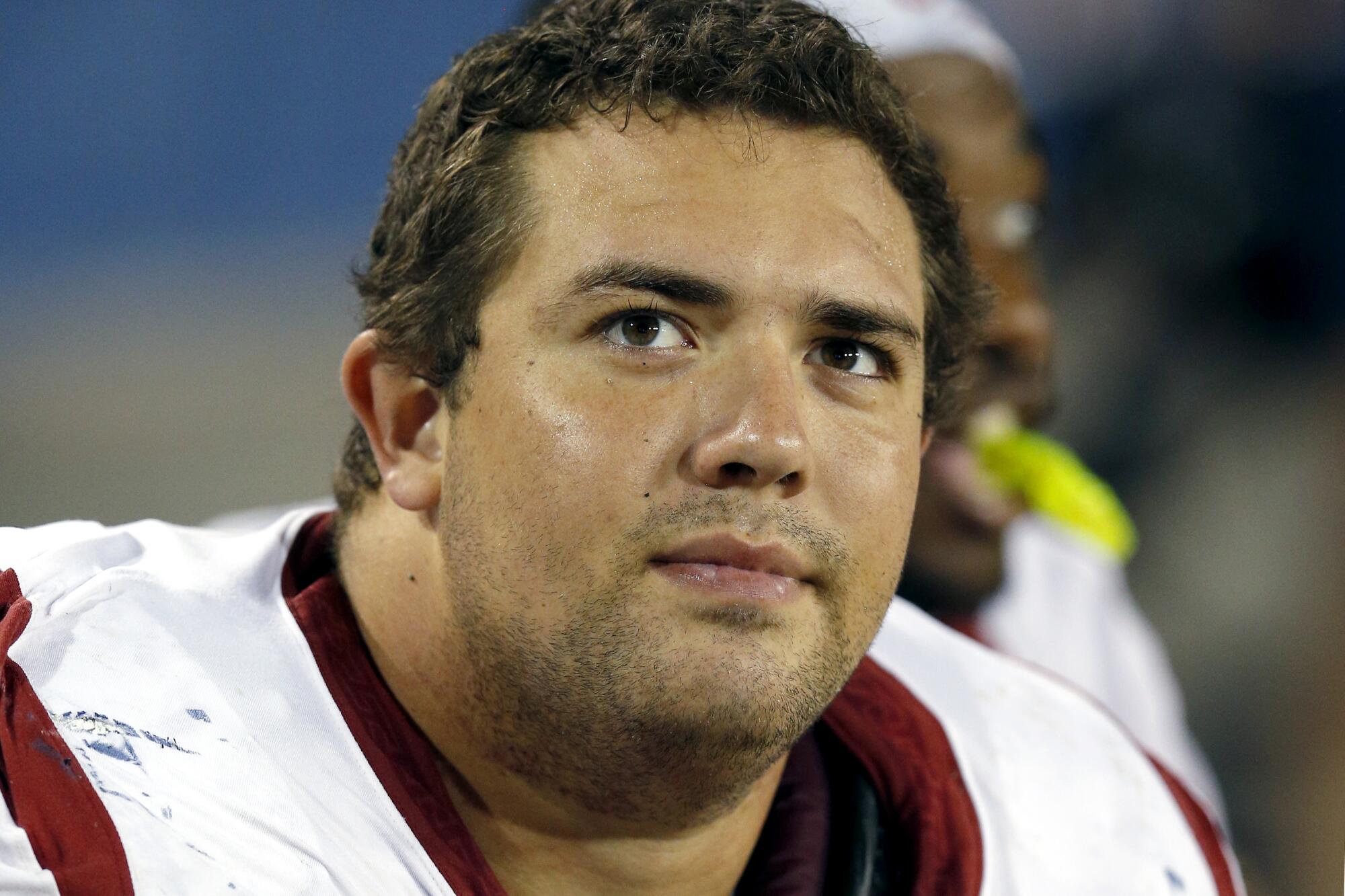
- Share via
Bob Brown sits in the driver’s seat of his red Polaris ATV, staring out over a paddock of horses. It’s quiet at this far end of the ranch. The distant din of live country music blaring joyously from the barn barely registers over the dry, desert breeze. It’s a rare moment of peace for Bob, who for the past two months has done everything in his power to stay busy and to fill the silence. But the solace is always only temporary, giving way to waves of sorrow that most days seem as inevitable as the tides.
It still feels like yesterday he and Chris were parked on the edge of this pasture, drinking Coors Lights and watching the horses roam. Since last spring, when the pandemic brought Chris back home, this was where father and son would talk — about the ranch, about music, about everything in between — dreaming up plans until the beer was gone and the sun was setting over the nearby hills.
The ranch was at the center of that future. Bob bought these 53 acres of desert wine country in Temecula in December 2019, fulfilling a promise he’d made to his wife, Erin, on their first date decades earlier. He planned to turn the California Ranch Co. into a family sanctuary and cowboy’s paradise, complete with a saloon, horse arenas, equestrian training grounds, a party barn, a wedding venue. But no one in the Brown family — not his older brother, Nick, not his younger sister, Kaylin — took to the ranch quite like Chris.
He loved cowboy hats and cut-off tank tops, line dancing and country western bars. Above all, Chris loved country music. He toted his acoustic guitar around like an extra appendage. He dreamed one day he would grace the stage at Stagecoach, a country music festival in Indio he attended every year. He had a stage name, Chris Ryan.
Life on the offensive line is marked by cadence, timing and rhythm — snap, step, hit.
“If you’re gonna be country, then you gotta live country,” Bob would tell his son. So when Chris was home, for days or weeks at a time, he would clean the stalls, feed the horses and cattle and work the land.
Over the last year, friends and family say, Chris seemed to settle on his path. After starring as an offensive lineman at USC, playing briefly with the Chargers, then detouring to Washington, D.C., to play in the short-lived XFL, Chris was ready to put football behind him. He landed a commercial real estate job. He poured his extra time into music, jotting down lyrics in journals and divining chords with Kaylin.
“He was finally content where he was at,” said Justin Caruso, his close friend and roommate.
The use of the past tense leaves those close to Chris with lumps in their throats. On April 17, eight days short of his 25th birthday, Chris Brown was found unconscious in a friend’s swimming pool during a party in Malibu. Eight hours later, he died in the hospital. An autopsy later revealed his death to be an accidental drowning, caused by acute alcohol intoxication.
Bob Brown, months after the tragedy, remembers his son as “a father’s dream.”
USC coach Clay Helton reported that former lineman Chris Brown has died at 24. Brown started all 14 games on the Pac-12 championship team in 2017.
He stares back out over the pasture. Then his phone rings. He is needed back on the ranch, where a live band is playing country music, steaks are on the grill and a horse competition is underway, all part of an event organized to celebrate his son’s life.
A short ride later, Bob ascends the stairs of the ranch’s horse arena to welcome the cowboys competing in his son’s honor. He grabs the microphone, takes a deep breath, and spits out a welcome speech. He apologizes for rambling.
“My son would be honored to be here with all of you,” he says.
He’s doing his best to put on a brave face. But as Bob reaches the exit, he leans both hands against a wall to steady himself, trying his best not to break down. The tears come anyway.
::
And I pray that when I go to sleep at night/
That I’ll wake up in paradise/
And meet you at the bar where we first met
— Chris Ryan
His friends find the journals a few days after the party. It’s a happy discovery. Leafing through the pages feels like a window into Chris they’d never seen before.
“Chris didn’t really share his feelings with us,” Caruso said. “So just to see that part of him, that was really special.”
Some of the journals are filled with song lyrics, dozens of stanzas of song lyrics. Others with random lists and goals and plans. They tell the story of a year of big change and fresh ambition, a pivot from football to his greatest passion, music.
Guitar came naturally to Chris. Since Bob and Erin bought him his first, a $25 Christmas present from Costco when he was 7 or 8, the guitar rarely left Chris’ side.

USC offensive lineman Chris Brown plays the guitar
After years of lessons, his music teacher told the Browns that he had nothing left to teach their son. So Chris taught himself from there, learning from YouTube clips, with a natural ear that allowed him to pick up songs after hearing them only a few times.
“No matter where he was or how he was doing, it would always end with him and his guitar in his hand,” says Wyatt Schmidt, a close friend and roommate, who also played football at USC. “There was nothing better than seeing the guy with his eyes closed, not even thinking about what he was doing, but just making up a beautiful blues country song. His fingers would just move.”
His athletic career tells a similar story. He was a natural baseball player first, once slugging four home runs in a Little League game. But as he continued to grow, football became his future. At Loyola High, Chris became one of the most coveted offensive line recruits in the country. He ultimately chose to stay close to home, picking USC over Oregon and Texas A&M, among others.
The first two years were rough. He redshirted as a freshman in 2014, then played sparingly in ’15. “He felt like a caged animal,” Bob says. But patience and hard work paid off and by 2017, he had developed into USC’s top lineman. In May 2019, Chris signed as an undrafted free agent with the Chargers.
It was clear, even to his coaches, that Chris had other aspirations. He often played his guitar in the locker room.
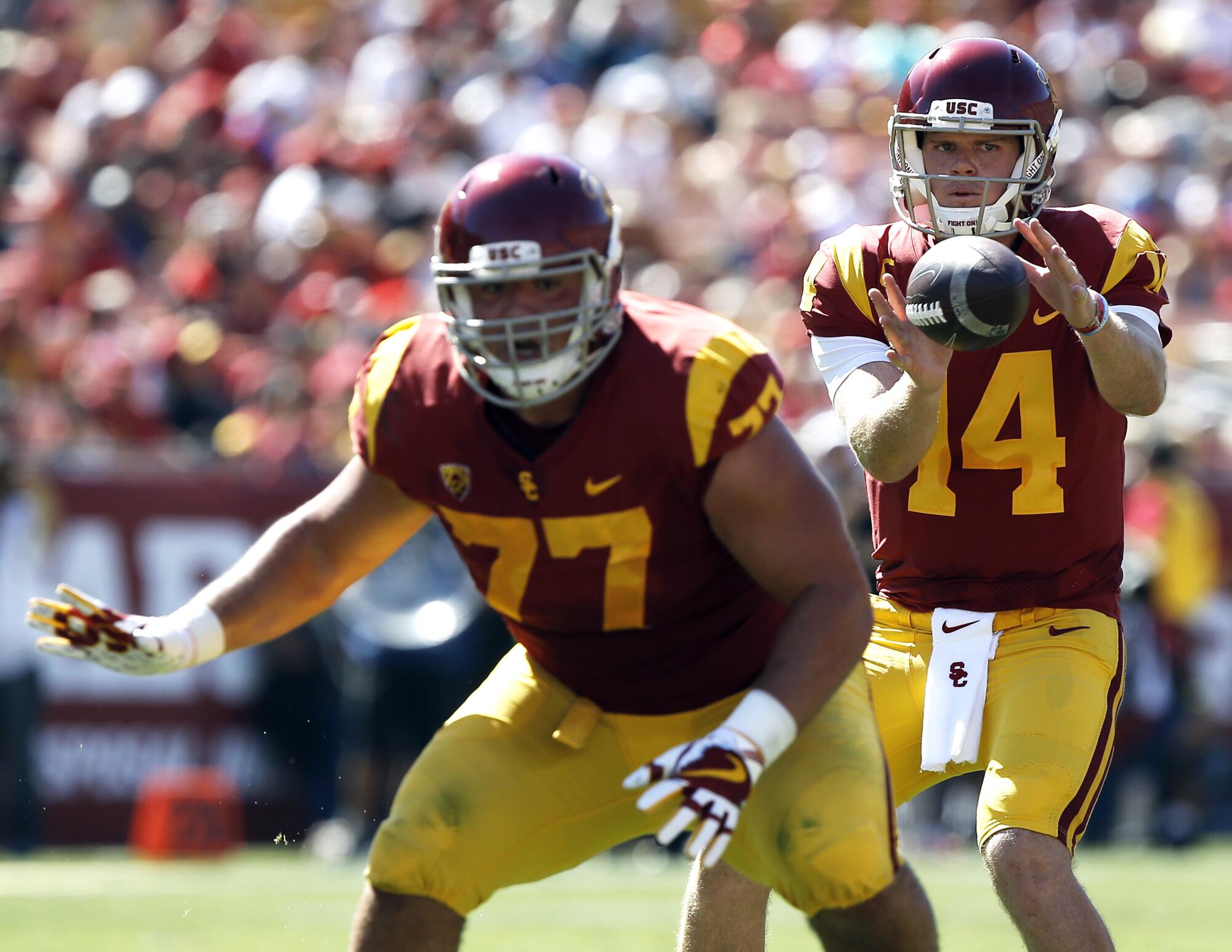
“Football wasn’t the end-all for him,” USC coach Clay Helton says. “Just one of those kids who was good at everything he tried. He was as good of a guitar player as he was a football player.”
Still, Chris tried to stick with football. When Chargers coaches once asked him what was important to him, he told them that he was getting through football by thinking about music. He was waived soon after, and bounced on and off the practice squad before landing with the D.C. Defenders of the XFL. He played five games, and earned a starting spot before the COVID-19 pandemic shut down the league.
“I know he just kept playing football because of me,” his father says now.
But the premature end to the season brought father and son closer together. Bob called the year that followed “a blessing in disguise.” For Chris, it brought relief and purpose, even if it was tough to give up the football paychecks. He focused on writing music, playing his guitar late into the night. He shared each of the new songs with Kaylin.
“He was finally content where he was at.”
— Justin Caruso
He committed to real estate and got a job as an associate agent at Lyon Stahl Investment Real Estate, a commercial brokerage in El Segundo. It didn’t come naturally this time. He had to cold-call clients, sometimes hundreds in a day. But he was determined. He wrote down career goals in his journal. He stayed late at the office. The last text he sent to Bob, just a few days before the April 17 party in Malibu, was a thumbs-up selfie from an empty office.
“Working leads,” Chris wrote.
“It only takes one,” Bob replied.
It seemed only a matter of time before Chris would find his stride in real estate. That, or write a hit country song. His close friends considered his future success a foregone conclusion.
It made losing him all the more devastating. But as his friends sit around a table at the ranch, trading stories and laughing about his quirks, there’s no question about the legacy he’s left among this tight-knit group.
“All the people really closest in my life now, that all came from Chris,” Schmidt said. “He brought everyone together. I think that’s what’ll stay with me most.”
::
The phone rang sometime after 9:30 p.m. on April 17. Bob was already in bed. “Chris was in an accident,” a voice on the other line told him.
Bob says he doesn’t remember any details of the two-hour drive to Malibu that followed. But he can’t forget the scene upon his arrival at Los Robles hospital in Thousand Oaks, where Chris’ friends stood scattered around crying. He sensed then that it was more than an accident.
Chris was on life support, hooked up to a ventilator. His oxygen levels were low. His body temperature, upon arriving, was hovering around 85 degrees. By the early morning, the rest of the family had arrived.
There were so many questions, but too few answers. The report from the Ventura County Medical Examiner’s Office only filled in a rough sketch of the details. The investigator noted that Chris had been drinking throughout the day and had a blood-alcohol level of 0.422. He was in the pool with 15 to 20 people when, for reasons unexplained, the others went inside. When they returned, between 30 seconds and two minutes later, Chris was underwater, unresponsive.
His death was ruled an accident, but there was no solace in that word. During Chris’ memorial service May 27, Bob saw four chairs where the family was sitting, so he reflexively grabbed a fifth. Every part of him felt like Chris was still there.
Colt Brennan was a star football player at Hawaii who finished third in Heisman Trophy voting before years of substance abuse problems cost him his life.
“The thing about grief is that it hurts,” Bob says. “Everyone does it on their own, but you also do it together as a family.”
Each member of the Brown family has dealt with it differently in the time since. Those first few weeks, Bob felt like he couldn’t breathe and tie his shoes at the same time. But he kept stacking days. He leans on his faith. He talks about acceptance and letting go of the pain, even as he feels it constantly detonating below the surface.
“He’s just going, going, going, going, trying to be as busy as possible,” Kaylin says, “so he doesn’t have to think about it.”
Chris’ younger sister has struggled being so public with her grief. The blown-up photos of Chris around the ranch are difficult for her to process. He was her best friend, her mentor, her confidant, her protector.
It wasn’t until the night before that she decided to speak at his memorial. Standing on the dais, at the Los Angeles Coliseum, she told the story of their last trip to Chris’ favorite country western bar, how a group of older women accused them of being con artists trying to steal their credit card info, and how Chris set out to defuse the situation while she vacated the bar.
It was a fitting scene to describe their relationship, the two like-minded siblings always beckoning trouble, only to laugh about it later. It’s those moments she misses most now.
::
My friends are all gone
This bottle of whiskey on my nightstand never lasts long,
I drink all alone,
Truck and a guitar are the only things I call my own
It’s more than I need, not quite what I want, but what can I do?
The only thing that I’m missing is you
— Chris Ryan
Two months have passed when friends and family flood onto the ranch to celebrate Chris’ life. The grief is still an open wound. But Bob prefers to air it out. The ranch buzzes with country music and true-to-life cowboys.
Memories and margaritas are flowing. Chris, spinning invisible turntables as an imaginary DJ. Chris, line-dancing with a cute girl at Stagecoach. Chris, devouring breakfast burritos and laughing at the strangest YouTube clips. He lives on in the stories, and there are plenty of those to go around.
For Kaylin, it’s too overwhelming to be at the ranch without Chris. She will leave on a flight for Oahu a few days later, her return date open-ended.
But for Bob, the land is a lifeline. He feels Chris here. He talks to him every morning. He sees his number 77 everywhere. “We couldn’t be in a better place in the world than this to heal,” he says.
He points off in the distance to Palomar Mountain, where another USC lineman, Max Tuerk, died unexpectedly on a hike last Father’s Day weekend. Max and Chris had been friends, and from time to time last summer and fall, Bob would find his son thinking about Max.
Football star Max Tuerk fell ill while on a long hike with his parents. Was CTE a factor?
“I told him to look out at the mountain, and you’ll feel him,” Bob says. “He’s always here.”
He lingers on that thought for a moment, thinking about Chris as a desert breeze blows, carrying the sound of a blues-country riff across the ranch.
More to Read
Go beyond the scoreboard
Get the latest on L.A.'s teams in the daily Sports Report newsletter.
You may occasionally receive promotional content from the Los Angeles Times.

